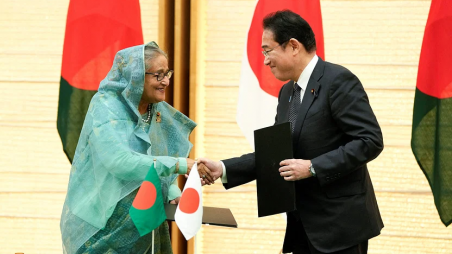Japan is becoming a major trading partner of Bangladesh in terms of export and investment. The country’s manufacturers have set a target of $10 billion in apparel export earnings from Japan by 2030. Also, Japan has emerged as a major source of investment for Bangladesh in recent years.
Bangladesh first export to Japan among the Asian countries in 2008. In the 2015-16 fiscal year, revenue from Japan crossed $1 billion. Exports that year stood at 1.32 billion dollars.

Figure: Japan becomes major trading partner of Bangladesh.
The higher growth in exports to the Japanese market, which has been using quality products for a long time, is a testament to the improvement in the quality of products made in Bangladesh. Even during the corona epidemic in 2019-20, the Japanese market did not disappoint Bangladeshis. At that time, despite serious problems in the global supply chain, Bangladesh exported goods worth $1.20 billion to Japan, the world’s third-largest economy.
In 2022-23, the country’s export grew by 40.74 percent compared to the previous year. Exports then reached $1.90 billion which was $1.35 billion in the previous fiscal year. Export income of readymade garments increased by 45.62 percent. In the fiscal year 2022-23, the export earnings in this sector increased to $1.59 billion from $1.09 billion.
In 2011, Japan relaxed its rules of origin and began removing tariffs on knitwear imports from least developed countries (LDCs), which boosted apparel shipments there. This was quite a relief for the exporters of Bangladesh. For many years, Japan had imposed a 17 percent tariff on knitwear products to protect its domestic industry. However, woven products have been receiving tariff preference for a long time.
2014 saw another important milestone in bilateral relations. That year, former Japanese Prime Minister Shinzo Abe visited Dhaka and launched the ‘Bay of Bengal Industrial Growth Belt Initiative for Bangladesh.
Along with being one of the major export destinations for readymade garments, Japan has become a major source of investment in Bangladesh. Between 2019 and 2022, foreign direct investment (FDI) from Japan increased by 7.61 percent annually, bringing total FDI into the country to $380 million.
The zone jointly owned by Bangladesh Economic Zone Authority (BEZA), Japan International Cooperation Agency (JICA) and Sumitomo Corporation was launched last December. Beza Executive Chairman Sheikh Yusuf Haroon said that they expect direct investment of about one and a half billion dollars in this economic zone. He hopes that commercial production will start in these factories next February.
The investment is expected to increase further after the government established a dedicated Japanese Economic Zone in Narayanganj. At present, about 350 Japanese companies are doing business in Bangladesh. In 2015, this number was 245.
According to a survey by the Japan External Trade Organization (JETRO), 44.4 percent of Japanese companies aim to expand their business in the next 1 or 2 years. Japanese institutions have a lot of
confidence in Bangladesh. 71.6 percent of the country’s companies are planning to expand their business in Bangladesh, the highest in Asia.
Notably, Japan’s Minister of Economy, Trade and Industry Nishimura Yasutoshi came to Dhaka on Sunday (July 23). His visit is aimed at increasing economic and trade cooperation between the two countries. During his visit to Dhaka, he will discuss the results of a joint study on the proposed EPA signing to increase trade and investment between the two countries. And also will attend the Bangladesh-Japan trade summit in Dhaka. He will hold separate meetings with Commerce Minister Tipu Munshi and Industries Minister Nurul Majid Mahmud Humayun.
JETRO’s Chief Country Representative UG Ando told the media that it is necessary to improve the business environment in Bangladesh by solving the problems of Japanese companies through the Economic Partnership Agreement (EPA). He also said that the local regulations should be compatible with the international regulations in the promotion of trade and investment. He hopes that Bangladesh will become the next investment destination for Japanese companies by creating a competitive investment environment through the EPA.
















